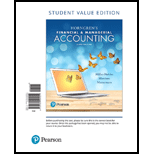
1.
Annual Report: It is a comprehensive financial report that shows all the business activities that takes place throughout the previous financial year. Its purpose is to provide the complete financial information of a company’s financial activities to its users in order to help them analyze and take well informed decisions.
To name: the
2.
To state: the amount of depreciation and amortization expense for the year ending January 30, 2016.
3.
To state: the amount of T Corporation’s additions to property, and equipment during the year ending 2016 and amount of sale proceeds from property, and equipment, if any.
4.
To state: the amount of
5.
To compare: the asset turnover ratio of T Corporation with K Incorporation.
Want to see the full answer?
Check out a sample textbook solution
Chapter 9 Solutions
Horngren's Financial & Managerial Accounting, Student Value Edition Plus MyLab Accounting with Pearson eText -- Access Card Package (6th Edition)
- Using the high-low method, estimate a cost formula for power cost. ??arrow_forwardJorgansen Lighting, Incorporated, manufactures heavy-duty street lighting systems for municipalities. The company uses variable costing for internal management reports and absorption costing for external reports to shareholders, creditors, and the government. The company has provided the following data: Inventories: Beginning (units) Ending (units) Variable costing operating income Year 1 Year 2 Year 3 310 260 260 290 290 350 $ 1,091,400 $ 1,043,400 $ 1,007,400 The company's fixed manufacturing overhead per unit was constant at $670 for all three years. Required: 1. Determine each year's absorption costing operating income. Note: Enter any losses or deductions as a negative value. Reconciliation of Variable Costing and Absorption Costing Operating Incomes Year 1 Year 2 Year 3 Variable costing operating income Add (deduct) fixed manufacturing overhead cost deferred in (released from) inventory under absorption costing Absorption costing operating incomearrow_forwardCalculate Dynamic's net income for the year ??arrow_forward
- Provide correct option general accounting questionarrow_forwardOn January 1, 2023, Pharoah Ltd. had 702,000 common shares outstanding. During 2023, it had the following transactions that affected the common share account: Feb. 1 Issued 160,000 shares Mar. 1 Issued a 10% stock dividend May 1 Acquired 181,000 common shares and retired them June 1 Issued a 3-for-1 stock split Oct. 1 Issued 78,000 shares ♡ The company's year end is December 31Determine the weighted average number of shares outstanding as at December 31, 2023. (Round answer to O decimal places, eg. 5,275.) Weighted average number of shares outstandingarrow_forwarduse the high-low method to calculate Smithson's fixed costs per month.arrow_forward

 AccountingAccountingISBN:9781337272094Author:WARREN, Carl S., Reeve, James M., Duchac, Jonathan E.Publisher:Cengage Learning,
AccountingAccountingISBN:9781337272094Author:WARREN, Carl S., Reeve, James M., Duchac, Jonathan E.Publisher:Cengage Learning, Accounting Information SystemsAccountingISBN:9781337619202Author:Hall, James A.Publisher:Cengage Learning,
Accounting Information SystemsAccountingISBN:9781337619202Author:Hall, James A.Publisher:Cengage Learning, Horngren's Cost Accounting: A Managerial Emphasis...AccountingISBN:9780134475585Author:Srikant M. Datar, Madhav V. RajanPublisher:PEARSON
Horngren's Cost Accounting: A Managerial Emphasis...AccountingISBN:9780134475585Author:Srikant M. Datar, Madhav V. RajanPublisher:PEARSON Intermediate AccountingAccountingISBN:9781259722660Author:J. David Spiceland, Mark W. Nelson, Wayne M ThomasPublisher:McGraw-Hill Education
Intermediate AccountingAccountingISBN:9781259722660Author:J. David Spiceland, Mark W. Nelson, Wayne M ThomasPublisher:McGraw-Hill Education Financial and Managerial AccountingAccountingISBN:9781259726705Author:John J Wild, Ken W. Shaw, Barbara Chiappetta Fundamental Accounting PrinciplesPublisher:McGraw-Hill Education
Financial and Managerial AccountingAccountingISBN:9781259726705Author:John J Wild, Ken W. Shaw, Barbara Chiappetta Fundamental Accounting PrinciplesPublisher:McGraw-Hill Education





